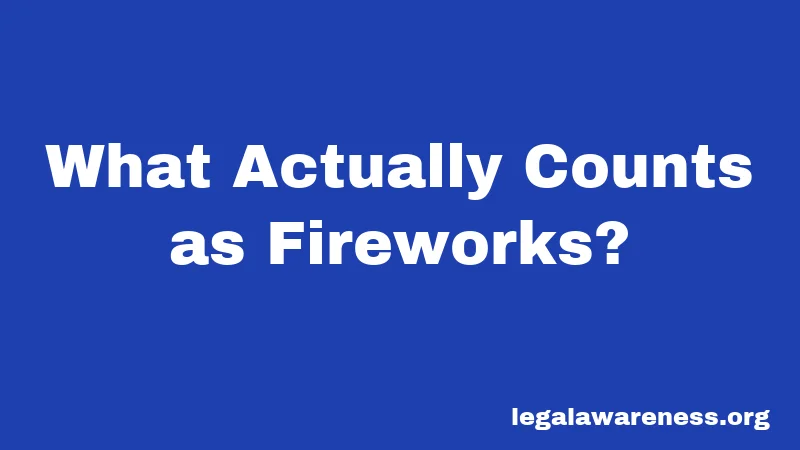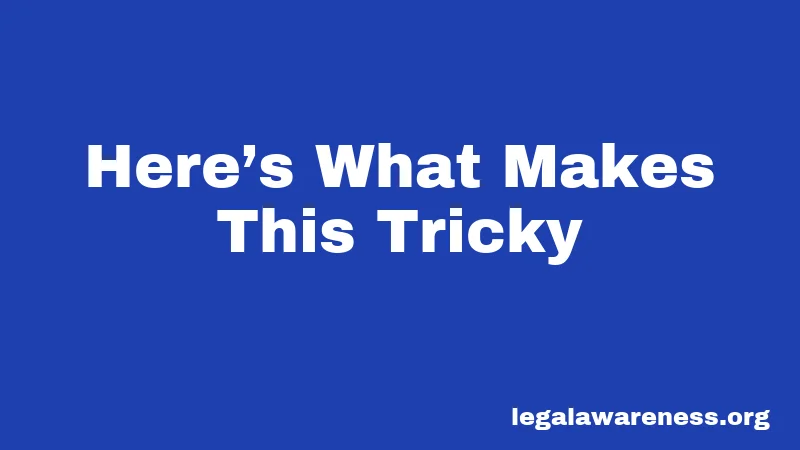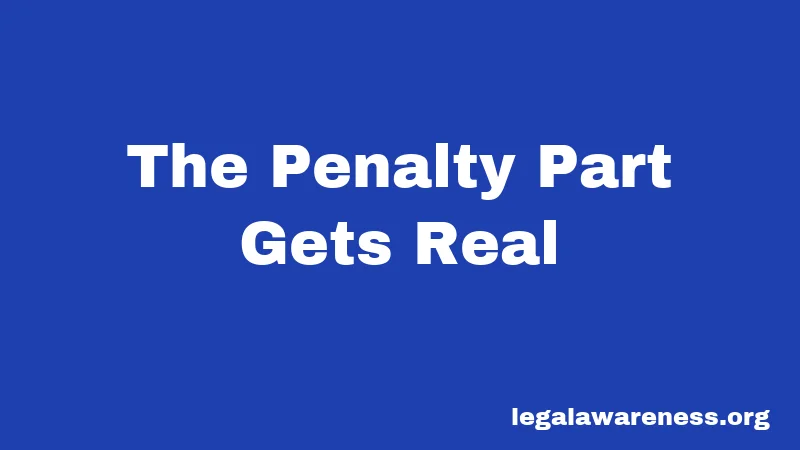Florida Fireworks Laws in 2026: When It’s Really Okay to Light Up
Most people think they can set off fireworks whenever they want. They absolutely cannot in Florida. This might surprise you, but the rules are actually pretty strict. Let’s break down exactly what’s legal, what’ll get you in trouble, and how to celebrate safely.
What Actually Counts as Fireworks?

Okay, so here’s where it gets interesting. Florida has a specific legal definition for fireworks. Basically, anything that flies into the air, visibly explodes, or makes a loud bang is considered a firework. That includes Roman candles, skyrockets, and firecrackers.
But hold on—not everything that makes noise is illegal. This is the part most people miss. Sparklers, party poppers, snappers, and smoke devices? Those are actually legal to use year-round. You can set those off whenever you want, no permit needed. The rules only get strict for the explosive, airborne stuff.
The Three Days You’re Actually Allowed to Use Fireworks
Here’s the big one. Florida law only allows consumer fireworks on three specific days per year. Those days are New Year’s Eve, New Year’s Day, and Independence Day (July 4th).
That’s it. Three days.
Not the day before. Not the day after. Just those three dates. Using fireworks on July 2nd or July 3rd? That’s illegal. Lighting them off early on July 5th? Still illegal. The law passed back in 2020, and it’s been pretty consistent ever since.
You’re allowed to set off fireworks anytime on those three holidays, but check your local laws. Some cities and counties have stricter rules about what time you need to wrap things up. Most communities expect things to quiet down by 10 or 11 p.m. to keep neighbors happy. Pretty reasonable, right?
Here’s What Makes This Tricky

The state law is just the umbrella. Your city or county can add their own restrictions on top of it. Maybe your area bans fireworks completely. Maybe your town only allows them until 9 p.m. Some counties have totally banned fireworks on beaches. You genuinely need to check your local ordinances.
Not sure about your area? Call your city or county government office. It takes five minutes and could save you a serious headache. Trust me, it’s worth the call.
Sparklers, Pop-Its, and Other “Always Legal” Fireworks
Need some good news? Certain novelty items are legal to buy and use any day of the year. These include sparklers, party poppers, snappers, smoke bombs, and glow worms. They’re considered low-hazard devices and pretty much anyone can use them anytime.
The catch? You have to actually follow the directions. Read the packaging. Use them responsibly. When you do that, they’re genuinely safe for home use. Most people get into trouble when they ignore the instructions or use them carelessly.
The Penalty Part Gets Real

Selling fireworks when you’re not supposed to? That’s a first-degree misdemeanor in Florida. Law enforcement can seize illegal fireworks without warning. The penalties can seriously add up.
Here’s the thing about regular people using fireworks illegally, though. The statute doesn’t list a specific fine for individuals who set off fireworks on illegal days. But that doesn’t mean you’re home free. You could still face charges for violating local noise ordinances, creating a public disturbance, or property damage caused by your fireworks.
Think of it like a traffic ticket situation. You might not get hit with the biggest penalty on the books, but you’re still breaking the law. Plus, your neighbors could call the cops, and that’s going to result in a conversation with law enforcement. Not fun.
If You Have an Agricultural Exemption
Wait, there’s actually a loophole here. Florida allows fireworks to be purchased and used year-round if you’re trying to scare birds away from farm property or fish hatcheries. Most retailers will ask you to sign a waiver confirming this agricultural purpose.
But here’s the reality: if you’re using fireworks to scare birds, you know you’re using them for that reason. Don’t buy fireworks claiming agricultural use and then set them off in your neighborhood for fun. Law enforcement knows how to follow up on suspicious claims.
What About Professional Fireworks Shows?
Those are totally different. Professional displays require permits and trained operators. You can’t just buy professional-grade fireworks and use them yourself. Those are meant for licensed professionals who know exactly what they’re doing.
If you want to see fireworks, go to an official city or county display. Most areas put on great shows for major holidays. They’re free, they’re safe, and you get to watch the professionals do what they do best.
Storing Fireworks Safely (If You Have Them)
If you legally bought fireworks for the Fourth or New Year’s, store them properly. Keep them in a cool, dry place away from kids and pets. Never store them in extreme heat or humidity. Damaged fireworks are dangerous fireworks.
Seriously, this matters. Poor storage has caused preventable accidents. Give your fireworks the respect they deserve.
Safety Tips If You Do Use Legal Fireworks
Okay, so you’re planning to light fireworks on an allowed holiday. Here’s how to do it without ending up in an emergency room.
Only one sober, responsible person should light the fireworks. That person should be fully focused on the task. Not drinking, not distracted, not goofing around. Fireworks demand respect and attention.
Place each firework on a flat, stable surface. Never hold them in your hands while they’re burning. Some people even wear safety glasses when lighting fireworks. Honestly, that’s smart.
Light fireworks one at a time. Step back immediately after lighting. If one doesn’t ignite? Leave it alone. Don’t relight it. Don’t pick it up. Just walk away and let it sit for a few minutes.
Keep water and a fire extinguisher nearby. You probably won’t need them, but having them available is just good sense. A small bucket of water works great. Fire extinguishers are cheap and could save your house.
Never use fireworks if you’re impaired. Ever. This isn’t optional.
Why These Laws Exist (And Why They Actually Make Sense)
You might wonder why Florida limits fireworks to three days. The reason is pretty straightforward: safety and property protection. Fireworks injure thousands of Americans every year. Most injuries are burns, but people lose fingers and toes from fireworks every single year.
Plus, stray fireworks cause property damage and house fires. Allowing fireworks only on specific holidays gives fire departments time to prepare. It also makes it way easier to prevent emergencies.
The law basically says: celebrate on these three days safely, and use approved novelties whenever you want. That’s a decent balance.
The Dry Weather Complication
One more thing to know. During drought conditions or high fire danger, local officials can ban fireworks even on legal holidays. This happens sometimes in Florida when conditions are extra dry. If there’s a burn ban in your area, you can’t use fireworks. Period.
This isn’t being overly cautious. Fireworks have started major wildfires. During fire season, this restriction exists for good reason.
Quick Comparison: How Florida Stacks Up
Wondering how Florida’s fireworks laws compare to other states? California’s rules are way stricter. They only allow fireworks between June 28 and July 6, and only to people 16 and older. Hawaii and Massachusetts pretty much ban consumer fireworks entirely.
Florida’s actually in the moderate range. Three allowed days gives you more freedom than some states but less than others. It’s a reasonable middle ground.
What If Someone’s Using Illegal Fireworks?
If your neighbors are setting off fireworks on July 15th or any other non-holiday date, you can report it. Call your local sheriff’s office or city police non-emergency line. They can investigate and follow up.
Honestly, most people just don’t know the rules. Having a friendly conversation with your neighbor might be all that’s needed. Show them this article. Help them understand the law. Most people will appreciate the heads up.
How to Report Injuries or Dangerous Situations
If someone’s injured by fireworks, call 911 immediately. For concerns about illegal or unsafe fireworks, call your local law enforcement non-emergency line. They need to know about dangerous situations.
If you’re injured by fireworks, seek medical attention right away. Burns, eye injuries, and lost fingers are serious medical emergencies.
Frequently Asked Questions
Can I set off fireworks on July 3rd if it’s my birthday? No, the law is three specific days: July 4th, New Year’s Eve, and New Year’s Day. Birthday fireworks would be illegal.
Are sparklers safer than big fireworks? Sparklers are lower-hazard devices and legal year-round, but they still burn hot. Treat them with care and keep them away from dry vegetation.
What if my city passed a fireworks ban before 2020? That ban still applies to you. The state law didn’t override existing city or county restrictions. Check with your local government.
Can I buy fireworks in another state and use them in Florida? You can buy them where they’re legal, but Florida’s rules apply to use. You still can’t set them off except on the three allowed days.
What’s the difference between legal and illegal fireworks? Legal ones don’t fly into the air or produce loud explosions (like sparklers). Illegal ones explode audibly or travel through the air (like Roman candles and firecrackers).
Final Thoughts
Florida’s fireworks laws are actually pretty clear once you know them. Three days. That’s your window. Use sparklers and novelties whenever you want. Everything else? Illegal outside those dates.
The laws exist to keep people safe and protect property. Respect them. If you celebrate responsibly, you and your neighbors will all have a better holiday. Stay informed, stay safe, and when in doubt, ask your local government. You’ve got this.
References
- Florida Statute 791: Sale of Fireworks – Official Florida Legislature
- Florida Sheriffs Association: Fireworks Safety – Official guidance from Florida law enforcement
- Florida Forest Service: Fireworks and Burn Bans – Information on fire safety and restrictions
- U.S. Consumer Product Safety Commission: Fireworks Safety – National fireworks injury data and safety information
- FOX 35 Orlando: Fourth of July Fireworks Legal Guide – Recent local reporting on Florida fireworks laws
